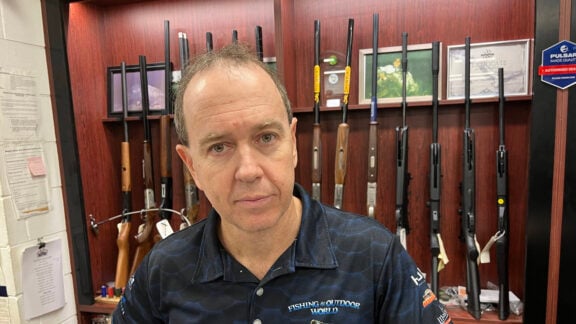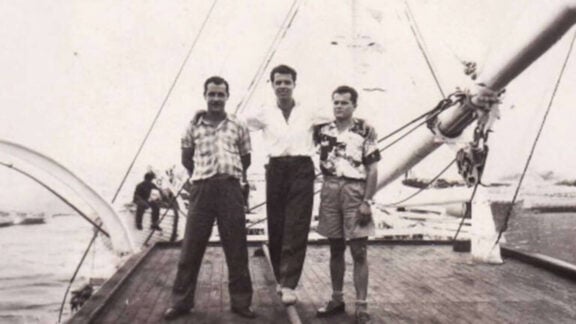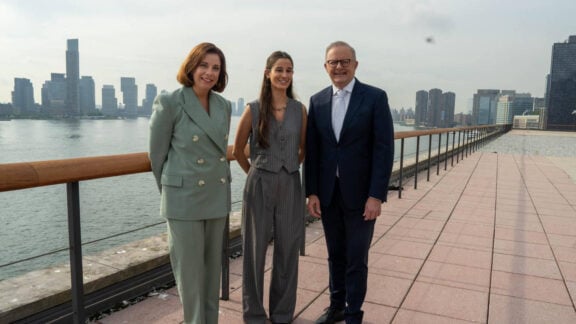Foreign Minister Penny Wong has expressed relief after a group of Australians crossed the border out of Gaza and into Egypt, as the Middle Eastern conflict continues.
Senator Wong confirmed 20 Australian citizens, one permanent resident and two family members were among those who left the Palestinian enclave through the Rafah crossing.
“We’ve been working towards this for a very long time … and I’m so relieved we have seen some Australians able to leave,” she told ABC Radio on Thursday.
“We were prepared on the Egyptian side with Australian officials to ensure that people were met and needs were assessed. We’ll continue to provide that consular assistance.”
Foreign Minister Penny Wong says government will keep working to ensure Australians can leave Gaza.
However, she said about 20 Australian citizens plus family members remained in Gaza.
“After so much international lobbying, I’m just so relieved that the Rafah crossing has been opened, at least overnight,” Senator Wong said.
“We will keep working to ensure we get as many of that Australian cohort out as possible.”
The news channel Al Jazeera reported a higher figure, saying 34 Australians were on an official list as having crossed at Rafah on Wednesday.
Qatar on Wednesday brokered a deal between Egypt, Hamas and Israel – co-ordinated by the US – for the border crossing to open.
Senator Wong urged Israel to listen to international calls for restraint during the conflict against Hamas, which is listed as a terrorist organisation by the federal government.
“When friends like Australia urge Israel to exercise restraint and protect civilian lives, it is really critical that Israel listens,” she said.
“There are ongoing civilian deaths, you’ve seen the international response. I think the reality is the international community won’t accept civilian deaths.”
The comments followed Israeli air strikes that levelled apartment buildings at a refugee camp in Gaza, drawing international condemnation.
The Israeli military said it killed a senior Hamas commander and had destroyed “underground terror infrastructure” beneath buildings.
Gaza’s Hamas-run health ministry said at least 50 people were killed in the Jabaliya refugee camp.
A Department of Foreign Affairs and Trade spokesperson said the government was helping 88 people in Gaza, which included Australians and their family members.
Assistant foreign minister Tim Watts said there were still more than 15,000 Australians in nearby Lebanon and reiterated warnings for people to leave due to fears the conflict could spread to other Middle East nations.
Tim Watts says Australians leaving Gaza were met by consular officials in Egypt.
He said there were no plans for further repatriation flights from Lebanon and that citizens there should use commercial options available.
“Our strong advice to Australians in Lebanon is take the option to leave now,” he said.
“We can’t make any guarantees that Beirut airport will remain open if the conflict spreads to the south of Lebanon and departure options become much more complex.”
It comes after Prime Minister Anthony Albanese spoke with Israeli counterpart Benjamin Netanyahu on Wednesday, almost a month since the terror group launched a horrific attack that killed more than 1400 people.
Israeli forces have killed another Hamas commander in their second strike on Gaza’s Jabalia refugee camp in two days, the military says, as the first group of civilian evacuees from the besieged enclave crossed into Egypt.
Pressing an offensive against Hamas militants, Israel again bombed the densely populated Gaza Strip from land, sea and air in its campaign to wipe out the Islamist group after its deadly cross-border rampage into southern Israel on October 7.
Palestinians sifted through rubble in a desperate hunt for trapped victims after Israel’s strike on Jabalia, Gaza’s largest refugee camp.
“It is a massacre,” said one witness of the strike.
The Israeli military said its fighter jets struck a Hamas command and control complex in Jabalia “based on precise intelligence,” killing the head of the Islamist group’s anti-tank missile unit, Muhammad A’sar.
“Hamas deliberately builds its terror infrastructure under, around and within civilian buildings, intentionally endangering Gazan civilians,” an Israeli statement said.
United Nations human rights officials said the operation could be a war crime.
“Given the high number of civilian casualties and the scale of destruction following Israeli air strikes on Jabalia refugee camp, we have serious concerns that these are disproportionate attacks that could amount to war crimes,” the United Nations High Commissioner for Human Rights wrote on X.
There were no immediate figures from Gaza authorities on casualties from the explosion at the camp on Wednesday. Palestinian health officials said the first Israeli airstrike on Tuesday killed about 50 people and wounded 150.
Israel said Tuesday’s strike killed Ibrahim Biari, who it described as a ringleader of the October 7 attack on Israel.
US Secretary of State Antony Blinken will travel to Israel and Jordan on Friday, the State Department said. He will meet Israeli Prime Minister Benjamin Netanyahu for an update on Israel’s military objectives, it said.
People evacuated to Egypt, trapped in Gaza since war began, included passport holders from Australia, Austria, Bulgaria, the Czech Republic, Finland, Indonesia, Italy, Japan, Jordan, the United Kingdom and the United States.
They were driven through the Rafah border crossing and underwent security checks, officials said.
On Wednesday, at least 320 foreign passport holders on an initial list of 500 as well as dozens of severely injured Gazans left, Egyptian sources and a Palestinian official said, under a deal between Egypt, Israel and Hamas.
At least 49 medical evacuees arrived in Egypt, the governor of Egypt’s North Sinai province told reporters later.
Israel sent ground forces into Hamas-ruled Gaza late last week after weeks of air and artillery strikes to retaliate for the surprise Hamas attack in which Israel says 1400 people, mostly civilians, were killed and 240 were taken hostage.
The Gaza health ministry says at least 8796 Palestinians in the narrow coastal enclave, including 3648 children, have been killed by Israeli strikes.
Hospitals struggled to cope as shortages of fuel forced shutdowns. Israel has refused to let humanitarian convoys bring fuel into the shattered enclave, citing concern that Hamas fighters would divert it for military purposes.
The desperate humanitarian conditions have prompted concern globally as food, fuel, drinking water and medicine run short.
Jordan, one of a handful of Arab states to have normalised relations with Israel, on Wednesday said it was pulling out its ambassador from Tel Aviv until Israel ends its assault on Gaza. Israel said it regretted Jordan’s decision.
Source: AAP








